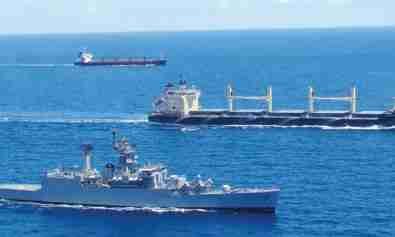The Gulf of Aden (GoA), which lies between the ‘Horn of Africa’ and the Arabian peninsula and forms a critical choke point for maritime trade plying through the Suez canal is of immense economic significance for global trade. A large percentage of India’s trade, including oil and fertilizers, passes through the GoA. Estimates of the Ministry of Shipping put the imports and exports through the GoA at about US $50 billion and US $60 billion respectively. The GoA accounts for 13% of our trade and given the fact that India’s large seafaring community accounts for nearly 7% of the world’s seafarers, the waterway is frequented by a large number of Indian nationals employed on merchant vessels plying through the area. These factors make the safety of navigation in the Gulf of Aden a national concern for India, from the economic and humanitarian standpoint.
The turn of 21st century saw steady rise of piracy off the coast of Somalia, thereby putting the safety of vessels transiting these waters in grave danger. The frequency and intensity of attacks saw a sharp rise in 2008. The Western Naval Command of the Indian Navy, swung into action to protect Indian mercantile trade and Indians employed at sea and commenced anti-piracy patrols in the GoA in October 2008. A number of regional and extra regional nations progressively deployed their warships in the area to safeguard their respective interests in the region.
Escort of Merchant Vessels
Given the complexity of tackling the overall piracy problem, the international community soon realised the importance of co-ordinating naval operations to present an effective response. In order to establish synergy and economical distribution of Naval effort in the multinational co-operative endeavours, an Internationally Recommended Transit Corridor (IRTC) was established to channel merchant traffic passing through the waterway and provide naval escort in a geographically limited area.
Typically, the patrols undertaken by war ships of the IN, take form of an escort wherein ships requiring to transit through Gulf of Aden are grouped Piracy operations till date, the IN has prevented more than 40 piracy attempts and has safely escorted over 3000 ships through these piracy infested waters.
While executing these patrols independently, the IN has spared no efforts to strengthen the multinational coordination to increase effectiveness of various monitoring and security mechanisms put in place in the GoA. The Indian Navy participates in various multilateral anti-piracy forums such as SHADE, CGPCS, RECAAP etc, thus contributing to global co-operation in addressing Maritime Piracy. In a broader strategic construct it assumes significance that contrary to their erstwhile competitive engagement in the region, most countries are cooperating over security concerns in the region and India is playing a major role in ensuring the safety of shipping east of Mediterranean.
The Indian Navy’s anti – piracy operations are not limited to only the Gulf of Aden but have covered major portions of the Western Indian Ocean since 2008. Decisive naval actions against pirate mother vessels in 2011 sent a strong deterrent signal to piracy networks, thus resulting in drawdown of the ‘Furthest line’ of piracy from Somalia Coast, and decline in the number of incidents. Anti-Piracy role is also integral to the deployment of WNC ships for joint EEZ surveillance in waters of Maldives, Seychelles and Mauritius.
Latest reports of the International Maritime Bureau, Piracy Reporting Centre (PRC), bring out that the IN’s action against pirates off the GoA has resulted in the seas on the Indian side being declared a safe area for merchant ships. The ‘High Risk Area’ of piracy, declared by International Maritime Organisation has accordingly been pulled away from Indian waters. The Western Naval Command remains at the forefront of Indian Navy’s antipiracy efforts and has slowly and steadily, turned the tide, rendering the Western Indian Ocean safer for international trade and seafarers.


